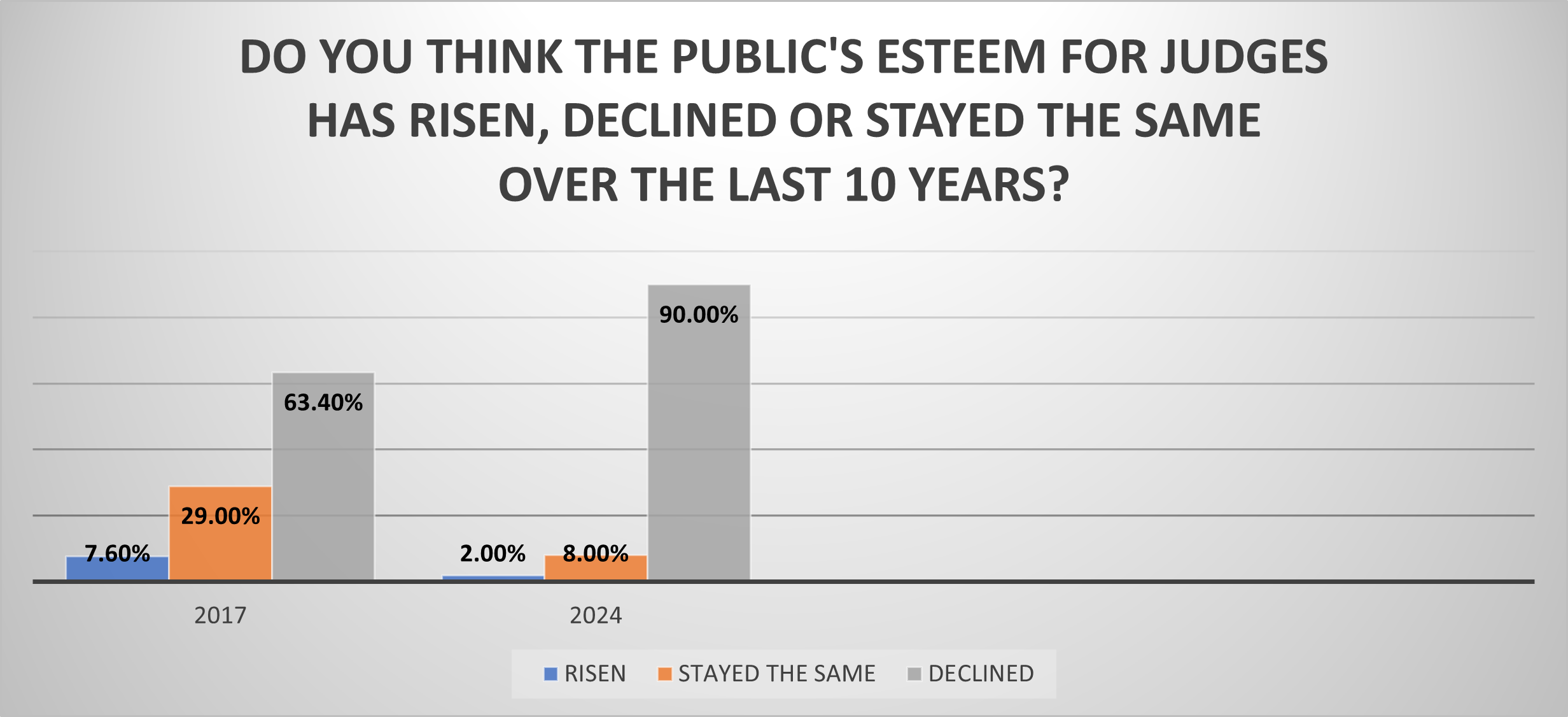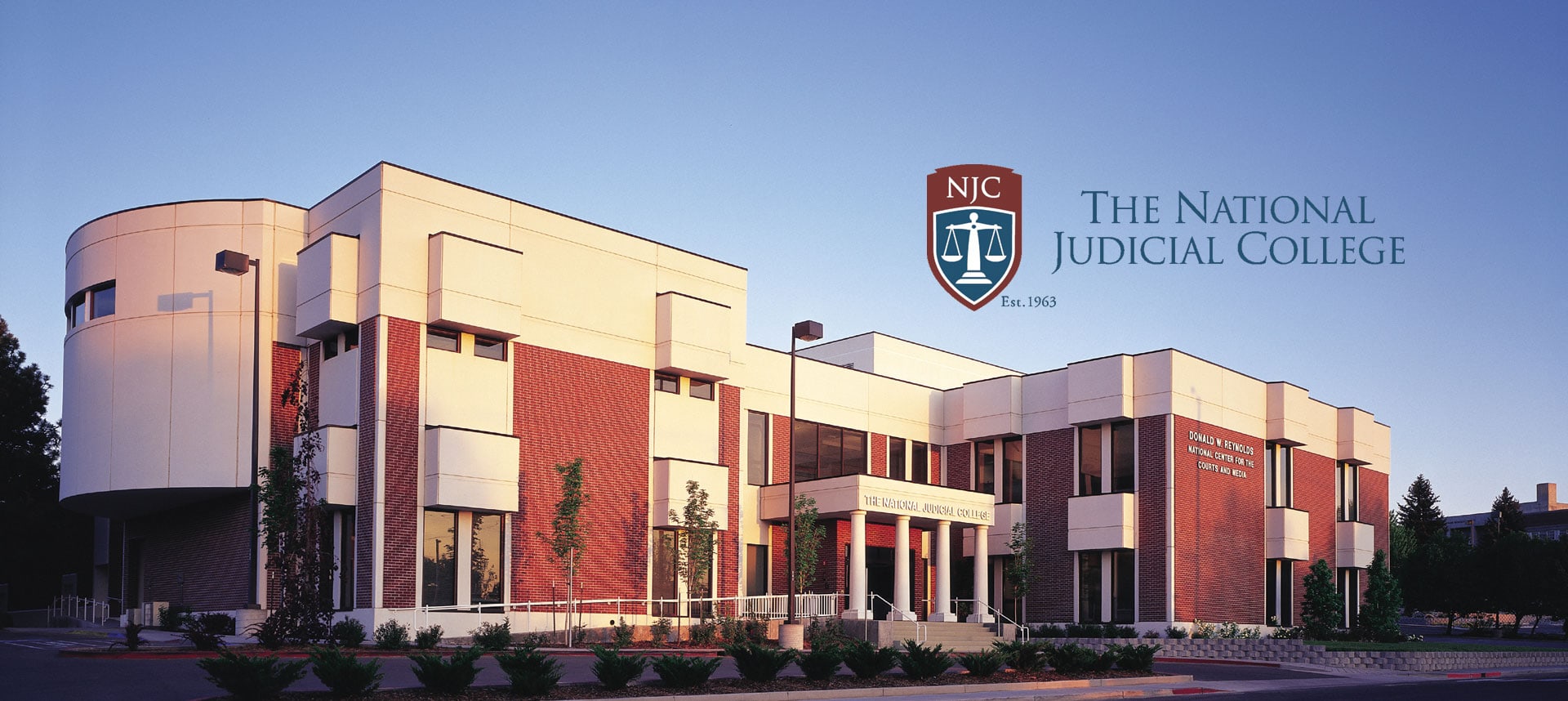
By Jenna Delacruz
In what may reflect a devastating blow to the morale of the judiciary, 9 out of 10 judges believe the public’s esteem for judges has fallen, according to our informal survey.
February’s Question of the Month* emailed to NJC alumni asked, “Do you think that the public’s esteem for judges has risen, declined, or stayed the same over the last 10 years?”
More than 90 percent of the 479 judges who responded said they thought it had declined. Two percent thought it had risen; 8 percent felt it had stayed the same.
In 2017, the College asked the same question of its alumni in the debut of this series of informal monthly one-question polls. At that point a discouraging 63 percent thought esteem for judges had declined over the previous 10 years, 8 percent thought it had risen, and 29 percent thought that it had stayed the same. The latest result translates to a 43 percent increase in the share of judges who perceive a decline in the public’s esteem.
In other words, seven years ago a clear majority of judges weren’t feeling the public’s love for their profession. Now that’s the case among nearly all judges.
“If 100% of us don’t say ‘declined,’ I will be shocked,’” predicted one anonymous judge among the 213 comments posted on the survey.
The most common explanations offered for the reputational decline:
- A perceived politicization of the Supreme Court of the United States (both in decisions and because of partisan confirmation battles);
- National leaders’ attacks on the judiciary (especially by former President Donald Trump);
- The COVID-19 pandemic (some judges perceived that a portion of the public turned against the government generally because of measures such as mask mandates and vaccination protocols);
- Increasing distrust of public institutions and reduced respect for authority generally over time;
- Greater visibility of negative news and comments about the justice system (e.g., police brutality, George Floyd killing) because of social media and conventional mass media coverage.
“Sadly, I feel like the Judiciary at all levels is being discredited because of the politicization and polarization of national politics,” wrote one anonymous judge.
NJC faculty member Anthony J. Baratta, former associate chief administrative judge for the Atomic Safety and Licensing Board Panel, wrote, “Recent decisions by the SCOTUS as well as partisan language in their decisions have contributed to a perception by the public that judges aren’t independent but are partisan.”
Without naming any particular culprit, Magistrate District Court Judge Doug Bell of Meyersdale, Pennsylvania, mentioned criticism of judges by high-profile individuals.
“[N]ational leaders openly and frequently disrespect the office and the person holding the same,” he wrote. “That blatant disregard emboldens others – litigants and lawyers – to feel free to do the same.”
Some judges speculated that the isolation younger people experienced during the pandemic, combined with extra time spent on social media during school closings, may have exacerbated a deterioration in social skills and respect for authority.
Some judges also said the decline in esteem was not limited to the judiciary.
“Public institutions have been under assault for the last decade like at no time in my lifetime,” wrote one anonymous judge.
Among the 8 percent of voters who felt esteem for judges had held steady over the past 10 years, some thought opinions varied by level and category of judges.
“With respect to trial judges at the state level, the public’s perception of them has remained the same,” an anonymous judge wrote. “[T]he highest courts (state supreme courts and U.S. Supreme Court) and federal circuits are uniformly seen as political and held in lower esteem.”
One unnamed judge felt esteem for most judges had actually risen overall but “unfortunately declined for some Supreme Court Justices.” The writer did not specify which justices.
Chief Judge Melissa Pollitt Bright of the Orphans’ Court for Wicomico County, Maryland, saw the decline as part of a broader phenomenon.
“The rule of law is being eroded away at an ever-increasing rate; esteem for judges is part of that,” she wrote. “I believe we have gone from small, quiet erosion to (a) catastrophic landslide, and I sadly believe that the destruction of our democracy may be imminent, perhaps as soon as the next election.”
A newly elected judge, Amy Wilson of the Las Vegas Township Justice Court, Department 7, was among the 2 percent who felt the public’s view of the judiciary had improved.
“[I]t was my experience while campaigning and interacting with the public that there was a sentiment of respect and appreciation for the judiciary. I consistently receive feedback that the work we do is appreciated and acknowledgement that our job is not easy.”
* Each month the College emails an informal, non-scientific one-question survey to its more than 12,000 judicial alumni in the United States and abroad. The results, summarized in the NJC’s Judicial Edge Today, are not intended to be characterized as conclusive research findings. The NJC is a nonpartisan, nonpolitical organization and these monthly polls are designed to engage our alumni in thought-provoking dialogue.

The Hon. Mary-Margaret Anderson (Ret.), a retired administrative law judge with the California Office of Ad...

Happy October, Gaveliers faithful. Are you loving this or what? No one believed a team made up of judges...


Hon. Diane J. Humetewa, the first Native American woman and the first enrolled tribal member to serve as a ...

Retired Massachusetts Chief Justice Margaret H. Marshall has been selected as the 2024 winner of the presti...